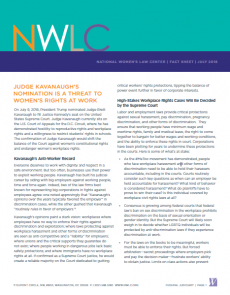 On July 9, 2018, President Trump nominated Judge Brett Kavanaugh to fill Justice Kennedy’s seat on the United States Supreme Court. Judge Kavanaugh currently sits on the U.S. Court of Appeals for the D.C. Circuit, where he has demonstrated hostility to reproductive rights and workplace rights and a willingness to restrict students’ rights in schools. The confirmation of Judge Kavanaugh would shift the balance of the Court against women’s constitutional rights and endanger women’s workplace rights.
On July 9, 2018, President Trump nominated Judge Brett Kavanaugh to fill Justice Kennedy’s seat on the United States Supreme Court. Judge Kavanaugh currently sits on the U.S. Court of Appeals for the D.C. Circuit, where he has demonstrated hostility to reproductive rights and workplace rights and a willingness to restrict students’ rights in schools. The confirmation of Judge Kavanaugh would shift the balance of the Court against women’s constitutional rights and endanger women’s workplace rights.
Kavanaugh’s Anti-Worker Record
Everyone deserves to work with dignity and respect in a safe environment. But too often, businesses use their power to exploit working people. Kavanaugh has built his judicial career by siding with big employers against working people, time and time again. Indeed, two of the law firms best known for representing big corporations in fights against employees agree: one noted approvingly that “Kavanaugh’s opinions over the years typically favored the employer” in discrimination cases, while the other gushed that Kavanaugh “routinely rules in favor of employers.”
Kavanaugh’s opinions paint a stark vision: workplaces where employees have no way to enforce their rights against discrimination and exploitation; where laws protecting against workplace harassment and other forms of discrimination are seen as anti-competitive and a “liability” for employers; where unions and the critical supports they guarantee do not exist; where people working in dangerous jobs lack basic safety protections; and where immigrants have no workplace rights at all. If confirmed as a Supreme Court justice, he would create a reliable majority on the Court dedicated to gutting critical workers’ rights protections, tipping the balance of power event further in favor of corporate interests.
High-Stakes Workplace Rights Cases Will Be Decided by the Supreme Court
Labor and employment laws provide critical protections against sexual harassment, pay discrimination, pregnancy discrimination, and other forms of discrimination. They ensure that working people have minimum wage and overtime rights, family and medical leave, the right to come together to bargain for better wages and working conditions, and the ability to enforce these rights in court. Corporations have been plotting for years to undermine these protections in the courts. Here is some of what’s at stake:
- As the #MeToo movement has demonstrated, people who face workplace harassment and other forms of discrimination need to be able to hold their harassers accountable, including in the courts. Courts routinely consider such key questions as when can an employer be held accountable for harassment? What kind of behavior is considered harassment? What do plaintiffs have to prove to win their case? Is this individual covered by workplace civil rights laws at all?
- Consensus is growing among federal courts that federal law’s ban on sex discrimination in the workplace prohibits discrimination on the basis of sexual orientation or gender identity. But the Supreme Court will likely soon weigh in to decide whether LGBTQ individuals will be protected by anti-discrimination laws if they experience discrimination at work.
- For the laws on the books to be meaningful, workers must be able to enforce their rights. But forced arbitration—secret proceedings where employers pick and pay the decision maker—frustrate workers’ ability to obtain justice. Limits on class actions also prevent working people from coming together to challenge harmful employer-wide practices. Corporate interests are hungry to expand forced arbitration and further block class actions that fight widespread discrimination.
- Bad employers are willing to exploit working people for bigger profits. Unions shift the balance of power, creating a more equal playing field for workers. They allow workers to band together and push for higher wages and better benefits, like affordable healthcare, equal pay, paid parental leave, and other protections – and women and other people of color have the most to lose from right-wing attacks to weaken unions. The Supreme Court recently gutted the way public sector unions raise the money they need to do their work. Right-wing groups are spending millions of dollars filing lawsuits with the goal of persuading the Supreme Court to destroy unions altogether.
- Everyone deserves a healthy and safe workplace and a way to blow the whistle when they face danger. But courts can create obstacles to enforcing these rights; for example, Kavanaugh has questioned the government’s basic authority to regulate certain workplaces and framed safety regulations as paternalistic. We need a Court willing to protect workers, not one that will allow employers to exploit and endanger them.
- The Supreme Court is one of the only backstops on Trump’s assaults on immigrant communities. But Kavanaugh has asserted that undocumented immigrants aren’t covered by labor law, just because of their immigration status. The Supreme Court ultimately will determine whether immigrants can be stripped of their workplace rights.
A Fifth Anti-Worker Justice Will Do Profound Harm
Brett Kavanaugh is bad for working people. The next Supreme Court justice will decide cases critical to the future of working women and their families. We cannot allow the balance of the Court to shift further in favor of corporate interests and against hard-won protections for workers. What we need is a justice who would uphold workers’ rights, including protecting workers from sexual harassment.
